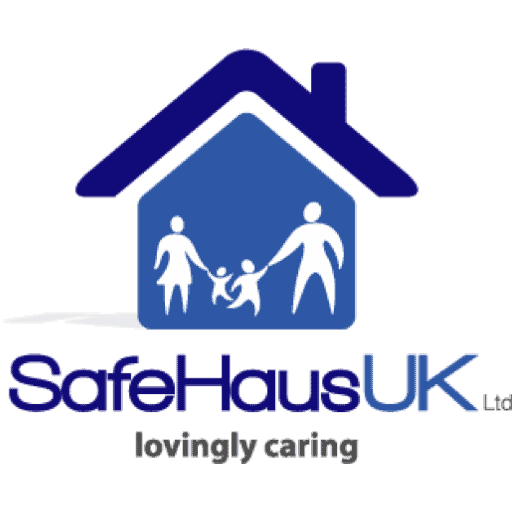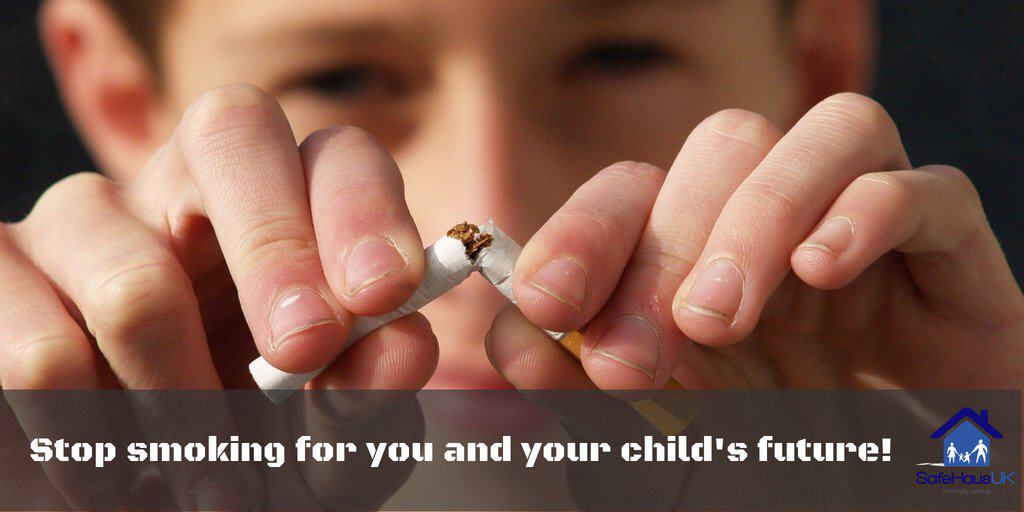31st of May is the world no-tobacco day, it is intended to encourage a 24-hour period of abstinence from all forms of tobacco consumption around the globe.
At SafehausUK we say no to smoking, especially smoking near children.
Cigarette smoke contains more than 4,000 chemicals, including truly nasty things like cyanide, lead, and at least 60 cancer-causing compounds. Millions of children are breathing in secondhand smoke in their own homes. Secondhand smoke can be especially harmful to your children's health because their lungs still are developing. If you smoke around your children or they are exposed to secondhand smoke in other places, they may be in more danger than you realize. Children whose parents smoke only outside are still exposed to the chemicals in secondhand smoke. The best way to eliminate this exposure is to quit.

1. Smoking effects on unborn baby:
Smoking during pregnancy is a definite no-go but for longterm smoker, quiting smoke for 9 months is not an easy option.
When you smoke during pregnancy, that toxic brew gets into your bloodstream, your baby's only source of oxygen and nutrients. Among all, two compounds are especially harmful: nicotine and carbon monoxide. These two toxins account for almost every smoking-related complication in pregnancy, including stillbirth, premature delivery, and low birth weight –because nicotine and carbon monoxide work together to reduce your baby's supply of oxygen. Nicotine chokes off oxygen by narrowing blood vessels throughout your body, and it's a little like forcing your baby to breathe through a narrow straw. To make matters worse, the red blood cells that carry oxygen start to pick up molecules of carbon monoxide instead. Suddenly, that narrow straw doesn't even hold as much oxygen as it should.

How smoking affects your baby:
If you smoke or are exposed to secondhand smoke when you're pregnant, your baby is exposed to harmful chemicals too. This may lead to many serious health problems, including:
- Miscarriage
- Premature birth (born not fully developed)
- Lower birth weight than expected (possibly meaning a less healthy baby)
- Sudden infant death syndrome (SIDS)
- Learning problems and attention-deficit/hyperactivity disorder (ADHD)

Weight and size
On average, a pack-a-day habit during pregnancy will shave about a half-pound from a baby's birth weight. Smoking two packs a day throughout your pregnancy could make your baby a full pound or more lighter
Body and lungs
Undersize babies tend to have underdeveloped bodies. Their lungs may not be ready to work on their own, they may spend their first days or weeks attached to a respirator. After they're breathing on their own (or even if they did from the start), these babies may have continuing breathing problems – because of delayed lung development or other adverse effects of nicotine. Children whose mothers smoked during pregnancy are especially vulnerable to asthma, and have double or even triple the risk of sudden infant death syndrome (SIDS).
Heart
A baby whose mother smoked in the first trimester of pregnancy is more likely to have a heart defect at birth.
In a U.S. Centers for Disease Control and Prevention (CDC) study published in February 2011 on 2,525 babies who had heart defects at birth and 3,435 healthy babies born in Baltimore and Washington, D.C., between 1981 and 1989, these babies' risk of having certain types of congenital heart defects was 20 to 70 percent higher than it was for babies whose moms didn't smoke.
Brain function
Smoking during pregnancy can have lifelong effects on your baby's brain. Children of pregnant smokers are especially likely to have learning disorders , behavioral problems, and relatively low IQs.
What can you do?
You can give your baby a huge gift by giving up your habit – the sooner the better. Ideally, you should give up smoking before you conceive. For one thing, you'll have an easier time getting pregnant. (Smoking lowers the chance of conceiving during any particular cycle by about 40 percent.)

But if you're still smoking when you discover you're pregnant, it's not too late. Immediately taking steps toward quitting can hugely benefit your baby.
Source: babycenter
2. Effects of 2nd hand smoke on children:
Infants have a higher risk of SIDS if they are exposed to secondhand smoke. Children have a higher risk of serious health problems, or problems may become worse. Children who breathe secondhand smoke can have more:
- Ear infections
- Coughs and colds
- Respiratory problems, such as bronchitis and pneumonia
- Tooth decay

Children of smokers cough and wheeze more and have a harder time getting over colds. and secondhand smoke can cause other symptoms including stuffy nose, headache, sore throat, eye irritation, and hoarseness.
Children with asthma are especially sensitive to secondhand smoke. It may cause more asthma attacks and the attacks may be more severe, requiring trips to the hospital.
What can you do?
If you, your partner or members of your family smoke, quitting and encourage quitting smoke is the best options. If it's too difficult, some alternative nicotine source will help at least eliminate the other 4000 harmful chemicals from cigarettes.
Nicotine Replacement Therapy (NRT) is available as:
- patches
- gum
- inhalator
- nasal spray
- mouth spray
- oral strips
- lozenges
- microtabs

Before using any of these products, speak to your midwife, GP, a pharmacist or a specialist stop smoking adviser. Remember, you are twice as likely to be successful at quitting if you get some support from a trained adviser.
E-cigarettes:
E-cigarettes allow you to inhale nicotine through a vapour rather than smoke.
E-cigarettes are fairly new and there are still some things we don't know. However, current evidence on e-cigarettes indicates they are much less risky than smoking. If using an e-cigarette helps you to stop smoking, it is much safer for you and your baby than continuing to smoke.

Source: NHS
3. Long-Term Effects of Secondhand Smoke
Children who grow up with parents who smoke are themselves more likely to smoke. Children and teens who smoke are affected by the same health problems that affect adults. Secondhand smoke may cause problems for children later in life including:
- Poor lung development (meaning that their lungs never grow to their full potential)
- Lung cancer
- Heart disease
- Cataracts (an eye disease)
What can I do?
Creating a Smoke-Free Environment
The following tips may help keep your children from being exposed to secondhand smoke:
- Set the example. If you smoke, quit today! If your children see you smoking, they may want to try it, and they may grow up smoking as well. If there are cigarettes at home, children are more likely to experiment with smoking—the first step in becoming addicted.
- Remove your children from places where smoking is allowed, even if no one is smoking while you are there. Chemicals from smoke can be found on surfaces in rooms days after the smoking occurred.
- Make your home smoke free. Until you can quit, don't smoke inside your home and don't smoke anywhere near your children, even if you are outside. Don't put out any ashtrays. Remember, air flows throughout a house, so smoking in even one room allows smoke to go everywhere.
- Make your car smoke free. Until you can quit, don't smoke inside your car. Opening windows isn't enough to clear the air and can actually blow smoke back into the faces of passengers in the back seat.
- Choose a babysitter who doesn't smoke. Even if the babysitter smokes outside, your children are exposed. Consider changing babysitters to find a smoke-free environment for your children.
- Encourage tobacco-free child care and schools. Help your children's child care or school, including outdoor areas and teachers' lounges, become tobacco free. Get your children involved in the effort to make schools tobacco free!

Source: healthychildren
To help prevent your kids from smoking:
- Talk about it in a way that doesn't make kids fear punishment or judgment.
- It's important to keep talking to kids over the years about the dangers of tobacco use. Even the youngest child can understand that smoking is bad for the body.
- Ask what kids find appealing — or unappealing — about smoking. Be a patient listener.
- Encourage kids to get involved in activities that prohibit smoking, such as sports.
- Show that you value your kids' opinions and ideas.
- Discuss ways to respond to peer pressure to smoke. Your child may feel confident simply saying "no." But also offer alternative responses such as "It will make my clothes and breath smell bad" or "I hate the way it makes me look."
- Emphasize what kids do right rather than wrong. Self-confidence is a child's best protection against peer pressure.
- Encourage kids to walk away from friends who don't respect their reasons for not smoking.
- Explain how much smoking governs the daily life of kids who start doing it. How do they afford the cigarettes? How do they have money to pay for other things they want? How does it affect their friendships?
What to Watch For
If you smell smoke on your child's clothing, try not to overreact. Ask about it first — maybe he or she has been hanging around with friends who smoke or just tried one cigarette. Many kids do try a cigarette at one time or another but don't go on to become regular smokers.
Other signs of tobacco use include:
- coughing
- throat irritation
- hoarseness
- bad breath
- decreased athletic performance
- getting more colds
- stained teeth and clothing (also signs of chewing tobacco use)
- shortness of breath
Getting Through to Kids
Sometimes even the best foundation isn't enough to stop kids from experimenting with smoking. If you find out that your kid smokes, it may be tempting to get angry, but it's better to focus on communicating with your child.

Here are some tips that may help:
- Resist lecturing or turning your advice into a sermon.
- Find out what appeals to your child about smoking and talk about it honestly.
- Many times, kids aren't able to appreciate how their current behaviors can affect their future health. So talk about the immediate downsides to smoking: less money to spend on things they like, shortness of breath, bad breath, yellow teeth, and smelly clothes.
- Stick to the smoking rules you've set up, and don't let a child smoke at home just to keep the peace.
- If you hear, "I can quit any time I want," ask your child to show you by quitting cold turkey for a week.
- Try not to nag. Ultimately, quitting is the smoker's decision.
- Help your son or daughter develop a quitting plan and offer information and resources, and reinforce the decision to quit with praise.
- Stress the natural rewards that come with quitting: freedom from addiction, improved fitness, better athletic performance, and improved appearance.
- Encourage a meeting with your doctor, who can be supportive and may have treatment plans.
Source: kidshealth
Further information
Book or message SafehausUK directly from our website http://safehaus-uk.co.uk/ for more information about our professional childcare service.

